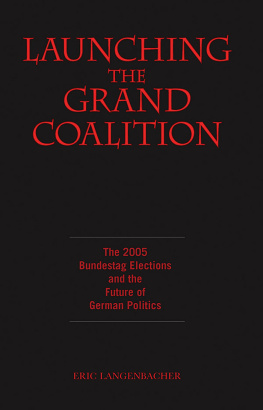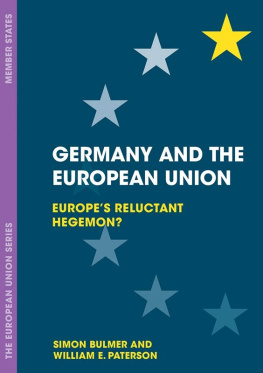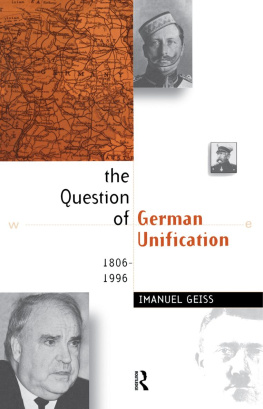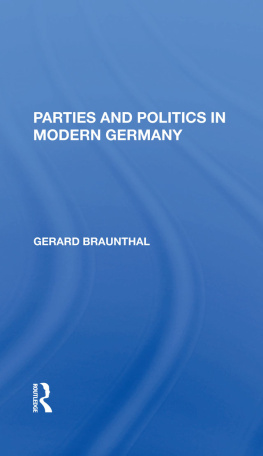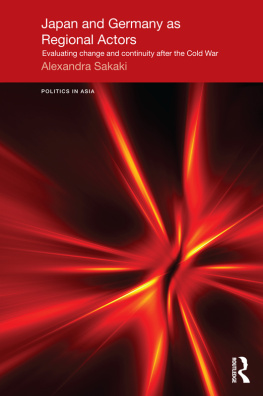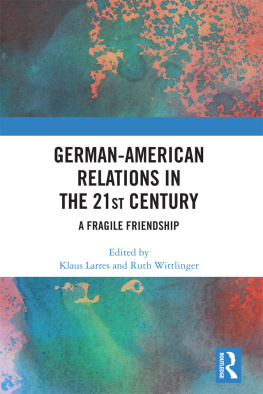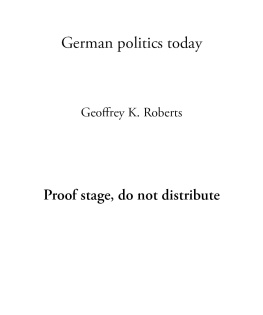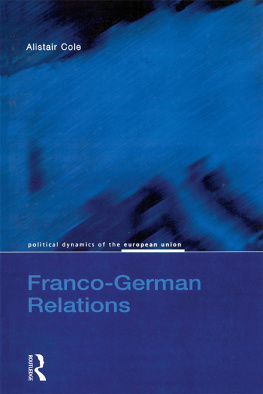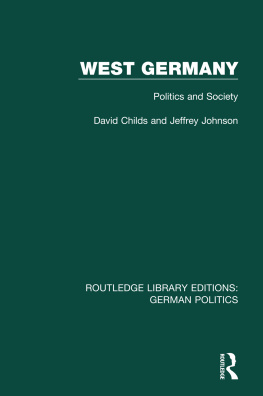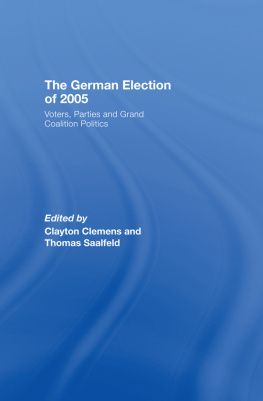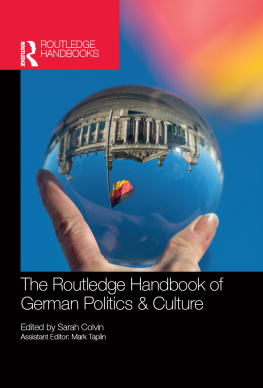Launching the Grand Coalition:
The 2005 Bundestag Election and the Future
of German Politics
Launching the Grand Coalition
The 2005 Bundestag Election and the Future of German Politics
Edited by
Eric Langenbacher
Published in 2006 by
Berghahn Books
www.berghahnbooks.com
2006 Eric Langenbacher
First ebook edition published in 2014
All rights reserved. Except for the quotation of short passages for the purposes of criticism and review, no part of this book may be reproduced in any form or by any means, electronic or mechanical, including photocopying, recording, or any information storage and retrieval system now known or to be invented, without written permission of the publisher.
Library of Congress Cataloging-in-Publication Data
Launching the grand coalition : the 2005 Bundestag election and the future of German politics / edited by Eric Langenbacher.
p. cm.
Includes bibliographical references and index.
ISBN 978-1-84545-283-4 (pbk.) -- 978-0-85745-773-8 (ebk.)
1. Germany. Bundestag--Elections, 2005. 2. Coalitions--Germany. 3. Germany--Politics and government--1990- . I. Langenbacher, Eric.
JN3971.A95L38 2006
324.943'0882--dc22
2006029299
British Library Cataloguing in Publication Data
A catalogue record for this book is available from the British Library.
ISBN 978-1-84545-283-4 paperback
ISBN 978-0-85745-773-8 ebook
Contents
Eric Langenbacher
David Conradt
Hermann Schmitt and Andreas M. Wst
Ludger Helms
Lars Rensmann
Myra Marx-Ferree
Dorothee Heisenberg
Jackson Janes
Jeffrey Kopstein and Daniel Ziblatt
Clay Clemens
There are many people and institutions behind a project such as this. First, I would like to thank German Politics and Society for providing the impetus and support for the special issue that forms the basis of this volume. The journals editor, Jeffrey Anderson and the BMW Center for German and European Studies at Georgetown University deserve particular mention. The team at Berghahn Books, especially Vivian and Marion Berghahn, was likewise supportive, efficient, and, as always, very professional. I would also like to thank the contributors for their outstanding analyses, insights and punctuality with deadlines. Above all, I would like to express my undying appreciation to my wife, Kayoko, and my boys, Adam and Max, for everything.
Introduction
The Drama of 2005 and the Future of German Politics
Eric Langenbacher
I recall a conversation from a while back with a colleague. He was disdainful of German politics, stating that they are ponderous, lackluster, even boring. He prefers to follow Italian politics because of the intrigue, emotion, and, most of all, the drama. Although forced to agree at the time that the contrast between the two countries could not be greater, I was also immediately reminded of the old (apocryphal) Chinese curse, may you live in interesting times.
My, how times have changed. German political life in 2005 witnessed some of the most dramatic events since at least the period of unification over fifteen years ago, and perhaps since the inception of the Federal Republic. It is this highly important and dramatic election to which Launching the Grand Coalition: The 2005 Bundestag Election and the Future of German Politics is dedicated. The contributors analyze the results, but also locate current developments in the history and traditions of the Federal Republic. Just as important, they project trends and policies into the future. What will Chancellor Angela Merkel and her grand coalition achieve? What will become of the German party system? What long-term structural changes are affecting German politics and policy-making?
Drama on the Left
As with the interpretation of any drama, one must first begin with a plot summaryan overview of the major, attention-grabbing developments. The narrative begins with a string of electoral defeats at the regional level that culminated in the Social Democrats ( SPD ) losing the state election in North Rhine Westphalia in late May 2005. This in itself was remarkable, seeing that the old Ruhrgebiet was a heartland of SPD support, ruled by the Social Democrats (at least as senior coalition partners) for nearly forty consecutive years. One of the reasons for this defeat was Chancellor Gerhard Schrders severe loss of support within his own party. Almost always fractious and divided between centrist moderates and trade union-oriented leftists, the party could not maintain solidarity and support in the face of the Red-Green governments reformist agenda and program (Agenda 2010, Hartz Reforms, etc.)and one might add, in the face of the daunting and structural economic and social problems that the country has faced for at least a decade. Radicals led inside and outside of the government by Oskar Lafontaine and others were never enamored of the telegenic, American centrism that Schrder represented, but at least he could win elections for the team. The regional defeats in the Lnder eroded even this tenuous reason for radical support. Schrder understood acutely the magnitude of the partys defeat in North Rhine Westphalia and elsewhere (and not just because of the legislative gridlock that this created in the opposition-controlled second house, the Bundesrat) and the dangers of the loss of internal support. He soon launched unprecedented political and constitutional machinations to salvage his power.
His first step was to bring down his own government by consciously staging and then losing a vote of confidence on 1 July 2005. Schrder engineered this as a last ditch attempt to maintain power, by forcing his party to declare support for him and by catching the opposition off-guard with the unexpected election that would have to follow. Of course, his official justification was that he lacked a mandate to govern and to implement his reforms and was calling the election early to obtain one. He added that Germany could not afford to lose another year or even two (until the next regularly scheduled Bundestag election) because of weak governance and gridlock. The constructive vote of non-confidence and other parliamentary norms were not supposed to allow for such a Weimaresque tactic. Yet, the Constitutional Court (Bundesverfassungsgericht) ruled on August 25 that it was constitutional and that a new election, already under way, was indeed necessary. Postwar Germany rarely had witnessed such expert maneuvering, nor such an adept political operative. Most surprising of all was that it almost worked, in light of the eventual resultwith the SPD retaining 34.2 percent supportversus just 35.2 percent for the Christian Democrats CDU/CSU . Despite this unexpectedly strong showing and some valiant attempts to try to remain chancellor, Schrder was gone quickly from the political stage (as were many other senior political figures). Finally, in the worst American fashion he very soon took up a high-level position on the board of a German-Russian pipeline consortium(Gazprom), a decision that generated enormous criticism because he had advocated this deal while in public office (and which was retrospective evidence for his overly close relationship with Putin and Russia).

